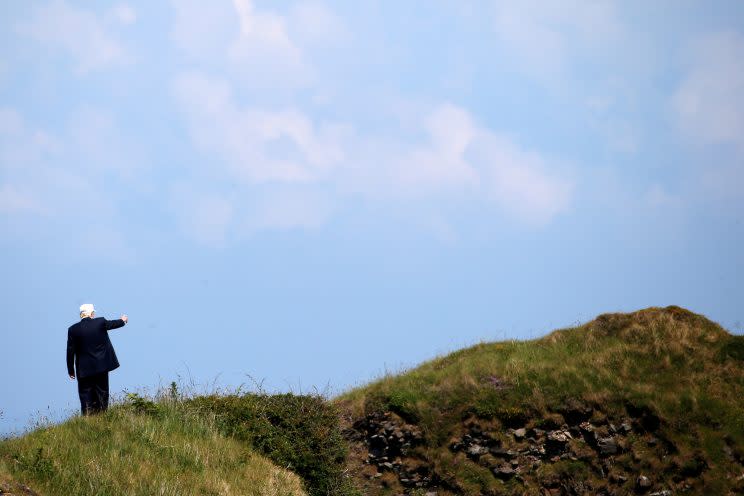Can Dump Trump forces succeed if he doesn’t collapse further in the polls?

Republican opponents of Donald Trump who want to derail his candidacy at the party convention are portraying him as doomed to fail against Hillary Clinton this fall. But while Clinton’s lead over Trump has grown recently, it has not yet reached a size that would match historical precedent for such a challenge.
Only two times in the modern age of party conventions has a party’s nominee faced a fight at the convention. In 1976, Ronald Reagan tried to oust incumbent President Gerald Ford at the Republican convention in Kansas City. And in 1980, Teddy Kennedy challenged incumbent President Jimmy Carter at the Democratic convention in New York.
Ford in ’76 and Carter in ’80 were both badly trailing their general election opponent, which invited defiance from within their own party. In 1976, Ford trailed Carter, the eventual winner, 2 to 1 in the weeks leading up to the GOP convention. And four years later, Carter trailed Reagan by anywhere from 14 to 20 points as the GOP convention neared, according to election rules expert Elaine Kamarck.
Then, as now, insurgency supporters argued that because their party’s presumptive nominee was sure to lose in the fall, a convention take-down was merited. “Win with Ted or lose with Carter,” said a button worn by one Kennedy backer in 1980.
Trump has dropped considerably in the polls as his own penchant for offending large swaths of voters encountered Clinton’s consolidation of Democratic support. He now is trailing Clinton by an average of around 7 points in all public polls, according to the Real Clear Politics average. And a new Washington Post/ABC News poll out Monday showed Clinton with a 12-point lead, her largest advantage in almost two months.
Trump opponents on Monday seized on the new numbers and increased their calls to let GOP delegates vote for someone else next month at the party’s convention in Cleveland.
“What is most probable and more obvious each day is that with Donald Trump as the Republican nominee, Hillary Clinton will be the next president of the United States,” wrote Erick Erickson, a Georgia-based conservative radio talk show host and publisher of TheResurgent.com. “The Republican Party must now choose between doing what is right and doing what is easy. What is right is denying Donald Trump the nomination so that we can stop Hillary Clinton.”
Steve Lonegan, a New Jersey convention delegate who is heading up a super-PAC running radio ads in Iowa supporting a contested convention, tweeted out numbers from the Post/ABC poll showing Trump with an 89 percent unfavorable rating with Hispanics and a 77 percent unfavorability with women. “How can Trump win with these ratings? There are options!” Lonegan said.
Much of the discussion around a potential contested convention has focused on how many delegates might vote against Trump, but those numbers are not set in stone and could change dramatically if Trump’s fortunes appear to be sinking. Delegates who prize party unity now might see things differently if Trump were trailing Clinton by 20 points consistently in polling.
And they would have more of a publicly acceptable argument for pushing for a new candidate, which is key in the modern era. Since 1972, delegates have been expected to vote based on the primary or caucus results in their state. But if public opinion changes between the primary vote and the convention, delegates give parties a safety valve by which to alter course before the fall election.
A Trump campaign official on Monday dismissed the talk of a contested convention.
“A lot people feel like they just can’t support Mr. Trump. I think they’ll get over it,” said Trump’s national campaign co-chairman, Sam Clovis, on MSNBC.
Meanwhile, anti-Trump forces who are working to lay the groundwork for an independent candidate for president said they are ramping up efforts to get on the ballot in at least 40 states and are aiming for all 50.
Better for America, the group preparing for an independent run, currently has 25 paid staff, most of them in New York, and from both Republican and Democratic political backgrounds. An official with the group said that there are three individuals who have said they would be willing to run for president, but that the group is still working to convince better-known individuals to take the plunge.
“[We have] not said we would support them nor have they said they are running at this moment. But all three are national or semi-national figures,” the official said. When asked if the three potential candidates were better known than National Review writer David French, who was thrust forward by conservative figure Bill Kristol, the Better for America official said two were “a little bit above [French] in terms of stature.”
Though Kristol is “in close communications” with Better for America staff, the official said he is not involved in this effort to recruit a candidate. “Bill remains very supportive but also understands that he’s got a key role in his role at the Weekly Standard. … This is not the Bill Kristol remix.”
And since the terrorist attack on an Orlando nightclub two weeks ago that took the lives of 49 people, some public figures who had previously declined to run as an independent presidential candidate have begun to reconsider, the official said. Trump’s response to the shooting, a “self-congratulatory tweet … broke the dam loose,” the Better for America official said.
“It’s been pretty remarkable some of the people who have said let me know what, let me take another look at this,” the official said. “I’ve had more outreach to me in the last two weeks than I had over the previous two months from potential candidates.”
Like the effort to fight Trump at the convention, however, the independent bid will likely remain a long shot unless Trump plummets in the polls, falling even further behind Clinton than he is now.



